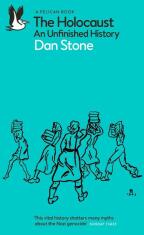0.0 z 5 hvězdiček
měkká vazbaKniha
- Produkt je nedostupný.
This book provides readers with an increased understanding of and sensitivity to the many powerful ways in which personal names are used by both perpetrators and victims during wartime. Whether to declare allegiance or seek refuge, names are routinely used to survive under life-threatening conditions. To illustrate this point, this book… Přejít na celý popis
 Světový bestseller, v němž se mladá překladatelka ujímá péče o cestovatele čase z 19. století, zatímco on se potýká se skutečnostmi, jako je pračka, Spotify, feminismus či rozpad Britského impéria.
Více informací
Světový bestseller, v němž se mladá překladatelka ujímá péče o cestovatele čase z 19. století, zatímco on se potýká se skutečnostmi, jako je pračka, Spotify, feminismus či rozpad Britského impéria.
Více informací
K tomuto produktu zákazníci kupují
-

-

-

-

-

-

-

-

-

-

-

-

-

-

-

-

-

-

-

-

-

-

-

-

This book provides readers with an increased understanding of and sensitivity to the many powerful ways in which personal names are used by both perpetrators and victims during wartime. Whether to declare allegiance or seek refuge, names are routinely used to survive under life-threatening conditions. To illustrate this point, this book concentrates on one of the most terrifying and yet fascinating periods of modern history: the Holocaust. More specifically, this book will examine the different ways in which personal names were used by Nationalist Socialists and targeted victims of their genocidal ideology. Although there are many excellent scientific and popular works which have dealt with the Nazi Germany and the Holocaust, to my knowledge, there are none which have examined the importance of naming during this period. This oversight is significant when one considers the incredible importance of personal names during this time. For example, many people are aware of the fact that Jewish residents were forced to wear a yellow star (the Star of David) on their outermost apparel to distinguish them from the Aryan population. It is also generally known, albeit much less so, that as of 1938, all Jewish citizens living within Nazi German or one of its occupied territories were also required to have either the word "Jewish" or the letter "J" stamped in their passports. However, comparatively few people realize is that before those regulations were implemented, Nazi leaders had decreed that all Jewish women and men must add the names `Sara' and `Israel' respectively to their given names. Once the deportations began, the perfidious logic behind this naming (onomastic) legislation became clear: it made it that much easier to pinpoint Jewish residents on official governmental listings (e.g. housing registries, voting rosters, pay rolls, labor union registers, bank accounts, school, university, military, and hospital records, etc.). Once the Jewish residents were identified, new lists of names were drawn up for people designated for relocation to a deportation center; relocation to labour camp; or transportation to an extermination center. By using first-hand accounts of Holocaust survivors, the direct descendants of Nazi war criminals, and chilling cases extracted from international and national archival records, this book presents a harrowing depiction of the way personal names were used during the Third Reich to systematically murder millions to achieve Hitler's dream of a society devoid of cultural diversity. Importantly, the practice of using personal names and naming to identify victims is not an historical anomaly of World War II but is a widespread sociolinguistic practice which has been followed in modern acts of genocide as well. From Rwanda to Bosnia, Berlin to Washington, when normal governmental controls are abridged and ethical boundaries designed to protect the human rights and liberties are violated, very quickly something as simple as a person's name can be used to determine who lives and who dies.
- Nakladatel
- Lexington Books
- Rozměr
- 147 x 237 x 34
- jazyk
- angličtina
- Počet stran
- 498
- Vydání
- 1
- isbn
- 978-1-4985-2597-8
- Vazba
- Knihy - vázané
- datum vydání
- 7.06.2019
- ean
- 9781498525978
Hodnocení a recenze čtenářů Nápověda
0.0 z 5 0 hodnocení čtenářů
0× 5 hvězdiček 0× 4 hvězdičky 0× 3 hvězdičky 0× 2 hvězdičky 0× 1 hvezdička
Přidejte své hodnocení knihy
Vývoj ceny Nápověda
Získejte přehled o vývoji ceny za posledních 60 dní.
Články, které stojí za pozornost
-

-

-

-

-

-

-

-

-

-

-

-




